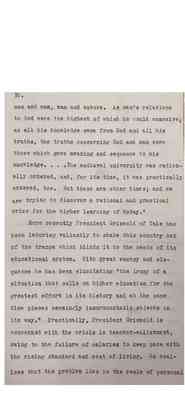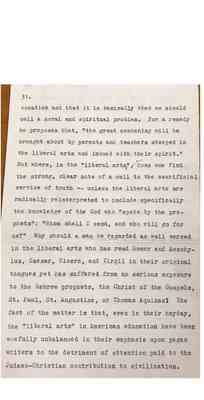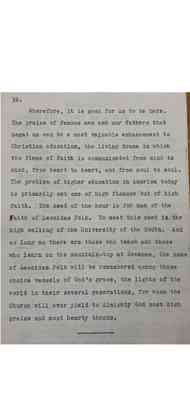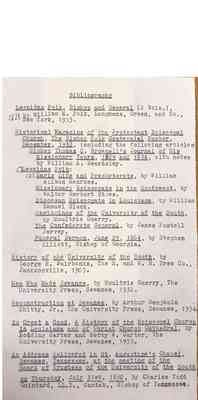Pages
31
-30-
man and man, man and nature. As man's relations to God were the highest of which he could conceive; as all his knowledge came from God and all his truths, the truths concerning God and man were those which gave meaning and sequence to his knowledge.... The medieval university was rationally ordered, and, for its time, it was practically ordered, too. But these are other times; and we are trying to discover a rational and practical order for the higher learning of today."
More recently President Griswold of Yale has been laboring valiantly to shake this country out of the trance which blinds it to the needs of its educational system. With great energy and eloquence he has been elucidating "the irony of a situation that calls on higher education for the greatest effort in its history and at the same time places seemingly insurmountable objects in its way." Practically, President Griswold is concerned with the crisis in teacher-enlistment, owing to the failure of salaries to keep pace with the rising standard and cost of living. He realizes that the problem lies in the realm of personal
32
-31-
vocation and that it is basically what we should call a moral and spiritual problem. For a remedy he proposes that, "the great awakening will be brought about by parents and teachers steeped in the liberal arts and imbued with their spirit." But where, in the "liberal arts," does one find the strong, clear note of a call to the sacrificial service of truth -- unless the liberal arts are radically reinterpreted to include specifically the knowledge of the God who "spoke by the prophets": "Whom shall I send, and who will go for us?" Why should a man be regarded as well versed in the liberal arts who has read Homer and Aeschylus, Caesar, Cicero, and Virgil in their original tongues yet has suffered from no serious exposure to the Hebrew prophets, the Christ of the Gospels, St. Paul, St. Augustine, or Thomas Aquinas? The fact of the matter is that, even in their heyday, the "liberal arts" in American education have been woefully unbalanced in their emphasis upon pagan writers to the detriment of attention paid to the Judaeo-Christian contribution to civilization.
33
-32-
Wherefore, it is good for us to be here. The praise of famous men and our fathers that begat us can be a most valuable enhancement to Christian eduction, the living drama in which the flame of faith is communicated from mind to mind, from heart to heart, and from soul to soul. The problem of higher education in America today is primarily not one of high finance but of high faith. The need of the hour is for men of the faith of Leonidas Polk. To meet this need is the high calling of the University of the South. And as long as there are those who teach and those who learn on the mountain-top at Sewanee, the name of Leonidas Polk will be remembered among those choice vessels of God's grace, the lights of the world in their several generations, for whom the Church will ever yield to Almighty God most high praise and most hearty thanks.
------------------------------------------------------------------------------------------------
34
BIBLIOGRAPHY
Leonidas Polk, Bishop and General (2 Vols.), by William M. Polk, Longmans, Green, and Co., New York, 1915.
Historical Magazine of the Protestant Episcopal Church, The Bishop Polk Centennial Number, December, 1938, including the following article's: Bishop Thomas C. Brownell's Journal of His Missionary Tours, 1829 and 1834, with notes by William A. Beardsley. Leonidas Polk: Early Life and Presbyterate, by William Wilson Manross. Missionary Episcopate in the Southwest, by Walter Herbert Stowe. Diocesan Episcopate in Louisiana, by William Samuel Slack. Beginnings of the University of the South, by Moultrie Guerry. The Confederate General, by James Postell Jervey. Funeral Sermon, June 29, 1864, by Stephen Elliott, Bishop of Georgia.
History of the University of the South, by George R. Fairbanks, The H. and W. B. Drew Co., Jacksonville, 1905.
Man who Made Sewanee, by Moultrie Guerry, The University Press, Sewanee, 1932.
Reconstruction at Sewanee, by Arthur Benjamin Chitty, Jr., The University Press, Sewanee, 1954.
So Great a Good, A History of the Episcopal Church in Louisiana and of Christ Church Cathedral, by Hodding Carter and Betty W. Carter, University Press, Sewanee, 1955.
An Address delivered in St. Augustine's Chapel, Sewanee, Tennessee, at the meeting of the Board of Trustees of the University of the South, on Thursday, July 31st, 1890, by Charles Todd Quintard, LL.D., Cantab., Bishop of Tennessee.



